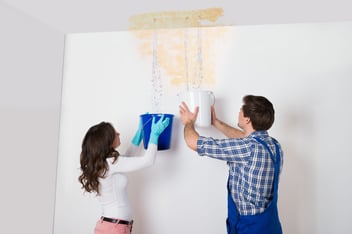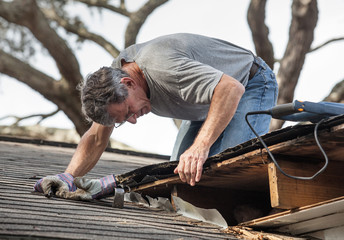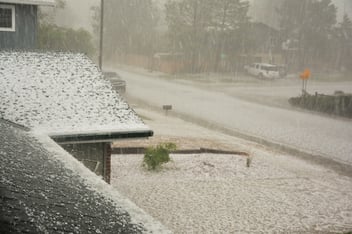Did you know that water damage causes 40% of all building-related problems?
Don't think you're protected because you bought a new home. After all, many roofs get leaks within the first two years of being built or renovated.
People spend over $12 billion annually repairing their roofs. If you have a roof leak, then you've likely received an estimate that's made your eyes water, too. The cost of unexpected roof repairs can significantly impact your budget.
But all is not lost! If you have homeowners' insurance, you could get that money back—if your insurance covers the damage.
Read on to determine whether homeowners' insurance covers a roof leak and how to make your roof leak insurance claim.
Home Damage Caused by a Roof Leak
Roof leaks can lead to house damage that can cost you a lot of money to repair.
Not only do they cause roof damage, but you can end up damaging your attic and any items you store in there. A leak will cause damage to the plaster and paint, light mounts, and fans.
Your roof leak can also get into the electrical system and become a fire hazard. Over time, the constant flow of water can lead to mold and mildew build-up.
Mold and mildew can cause long-term health damage, including upper respiratory tract symptoms, cough, and asthma-like symptoms. It can also compromise the structural integrity of your home, which means a large part of the roof can give way or fall.
Does Insurance Coverage Extend to Roof Leaks?
You want to ask yourself whether your house insurance covers roof leak damage.
There are many different types of home insurance policies.
For example, an HO-1 policy covers named perils: it only covers damage caused by certain specified disasters like hailstorms and windstorms. On the other hand, an HO-2 broad form policy covers a wider range of specified disasters like accidental steam or water damage, damage caused by the weight of ice, sleet, or snow, and more.
Generally, home insurance covers roof damage if it is included in the named perils. However, you should always review your roof damage homeowners insurance policy to see what specific hazards they cover.
What Does Homeowners' Insurance Usually Cover?
House insurance usually covers perils outside of your control, like environmental factors.
For example, your insurance policy will likely cover hail, windstorms, lightning, volcanic eruption, the weight of snow and ice. It would also cover theft, vandalism, explosions, and damage from vehicles or aircraft.
There are also certain types of roof damage that your insurance will not cover. These are called exclusions.
For example, your insurance will not cover regular wear and tear caused because your roof is 15 to 20 years old. In addition, your insurance may not cover for damage due to earthquakes, landslides, infestations, and floods.
You can add earthquake and flood insurance to your policies, but note that this addition will increase your premiums.
Remember to maintain your roof and keep the paperwork safe. You don't want to lose a payout because you didn't have the correct paperwork. Insurers will not pay out—or will pay out a lower sum—if they believe that the roof was already damaged due to regular wear and tear.
You will have to pay a deductible that could range from $500 to $1,000. There's a difference between regular storms and hurricanes for your insurer. You may need to pay a higher deductible if it's a hurricane.
Process of Filing a Roof Leak Insurance Claim
The process for filing a claim can be simple if you have the correct paperwork and evidence. It's the negotiation for a settlement that can result in delays and additional stress.
Review Your Homeowners' Policy
The first thing you have to do is review your policy and determine your insurance coverage. You want to make sure your insurance covers roof leaks and this is explicitly stated in the policy.
Assess the Damage
Has your roof leak been there for years? Did wear and tear cause the leak? Did the leak happen suddenly, or was it an accident?
When you assess your roof, you need to ask all these questions and more. Questions like this will help you determine what your payout may be. Make sure you're aware of the details of the damage so you can manage expectations.
Get an Estimate
Roofing contractors are usually experienced with insurance claims. Therefore, make sure they are aware that you plan on contacting your insurance company.
They will take pictures of the roof and store the information for easy access by your insurer. This is essential information as you'll use this to build your case.
Don't Delay
Don't waste any time in getting a contractor in if you see any roof damage. You don't want to wait too long and have the insurance company claim neglect rather than a sudden or accidental cause.
This can reduce your payout. Remember, it's in the insurance company's best interest to reduce your payout, so you want to protect yourself as much as you can.
Get the Evidence Ready
Even if the contractor is taking pictures, you want to ensure you have your photos as evidence. You also want to make a list of all the damage. If you have before pictures, you can use them to support your claim to show how your home looked before the roof damage.
If you got your roof repairs in the past, you want to keep that documentation handy. This can support the claim if your insurer argues that it's wear and tear or neglect.
Contact Your Insurance Company
Complete these steps as quickly as you can and contact your insurance company. They will send an insurance adjuster to look at all the damage within a few days. Let your contractor know when the insurance adjuster is coming because they may have questions for the insurance adjuster.
You should ask the contractor to be there because they can point out the damage better than you can.
Ask Questions
When your insurance adjuster comes, ask them questions. Get an understanding of where they stand because you want to prepare yourself with evidence to know what they're thinking.
You don't want to be blindsided. If you ask the right questions, you can understand what they're thinking and get prepared.
How Will Your Insurance Company Pay You?
If your insurance company accepts the claim, then the roofing contractor can start his work. Once the work is complete, you have to pay the roofing contractor directly. You will get the funds from the insurance company later.
If you have a mortgage, the insurance company's check will be made out to both you and the mortgage lender. This is because the bank or mortgage company has a financial interest in your home. Therefore, they will have to endorse the check.
Usually, the lender takes the check and holds the money escrow. Then, they'll pay for the repairs when the work is done.
If additional work needs to be done, the contractor will give you an invoice that you need to pay. You can receive these funds back from your insurance company.
Getting the Maximum Payout
Your insurer could claim that that whole roof is not damaged and only pay for repairs. This can reduce your payout.
People who use a public adjuster for their insurance claim can get about 700% higher payments on average. It's one way you can protect yourself when bringing your roof leak insurance claim.
Most insurance companies want to pay out as little as they can. They will try to push back and find a reason to reduce your payout. You can put yourself at a disadvantage against someone who does this for a living by negotiating yourself.
You don't want to get a lower settlement because you weren't prepared. This is where a public adjuster comes into play. The best part is they get paid when you get paid. So you're never out of pocket when you contact the right public adjuster.
What if your claim gets denied? Claims can be rejected for many reasons, but remember, you can always contact your public adjuster and ask them to fight for you.
They have the expertise to review the denial and determine if there is a possibility of a payout. They'll visit your property and gather evidence to build your case.
If you don't have the right experience in the area, you might make mistakes. However, with an expert by your side, you'll be protected and get your payout from your insurer.
Schedule a Free Roof Leak Consultation Today
Now you know what you need to do to check if your homeowner's insurance policy covers roof damage caused by a roof leak. First, you need to know your policy inside and out. And, most importantly, you need to hunt down an experienced, dedicated public adjuster who's willing to fight for you.
Schedule a free consultation with United Claims Specialists today!




 Storm Damage
Storm Damage  Property Damage
Property Damage Appraisal Services
Appraisal Services Contact Us
Contact Us




.jpg)
 claims@ucspa.com
claims@ucspa.com Mon-Fri: 9:00am-5:00pm
Mon-Fri: 9:00am-5:00pm